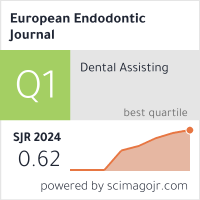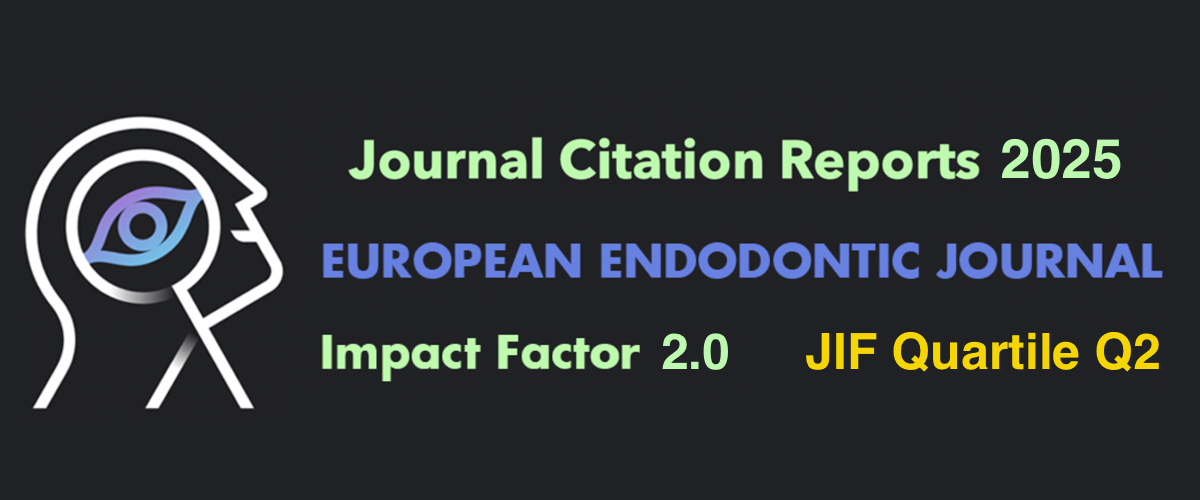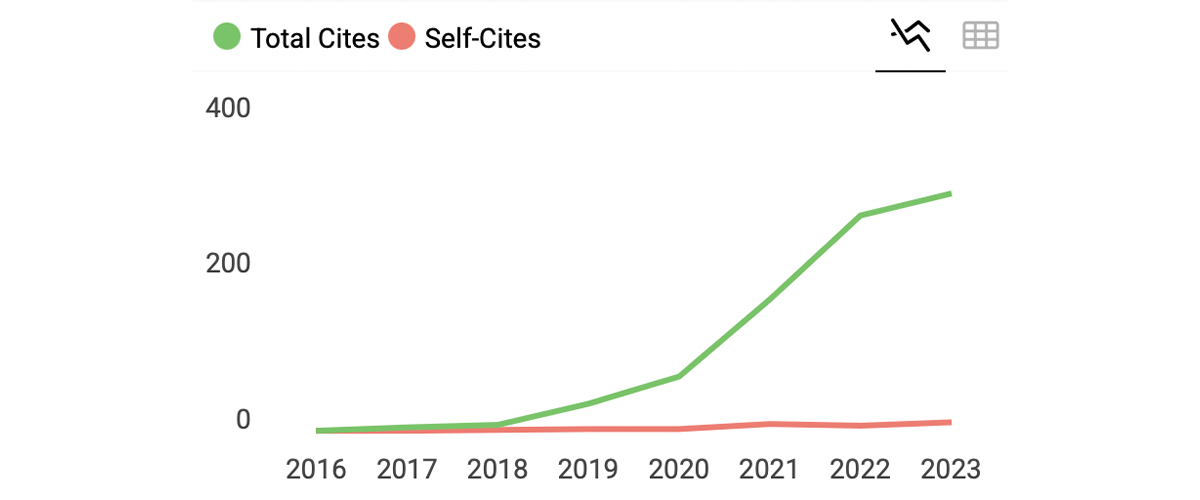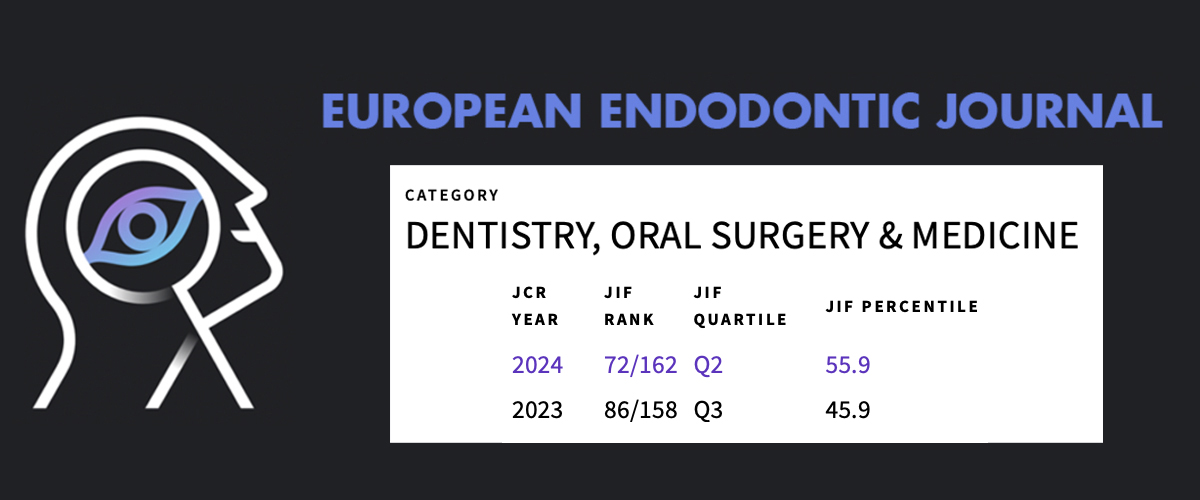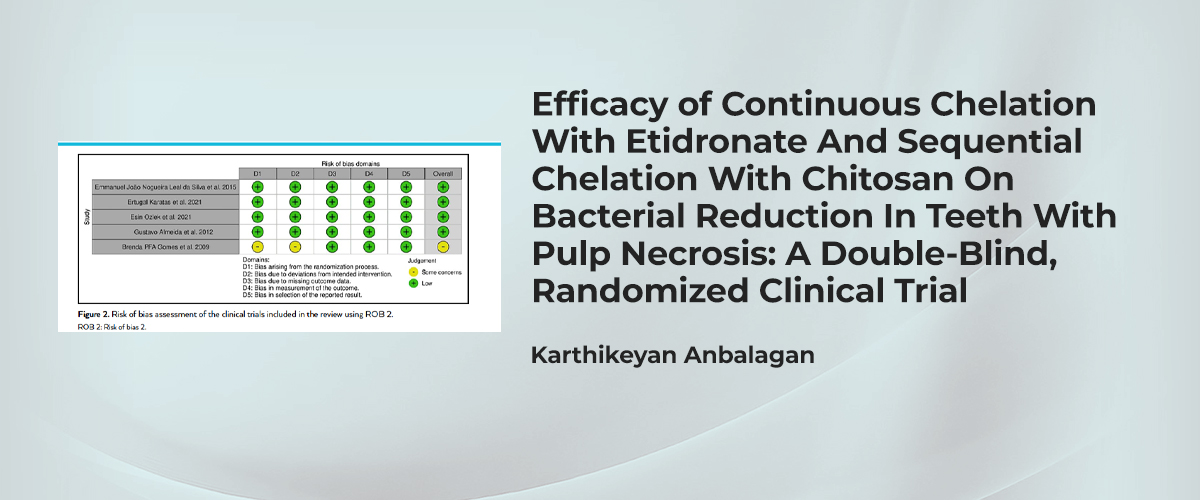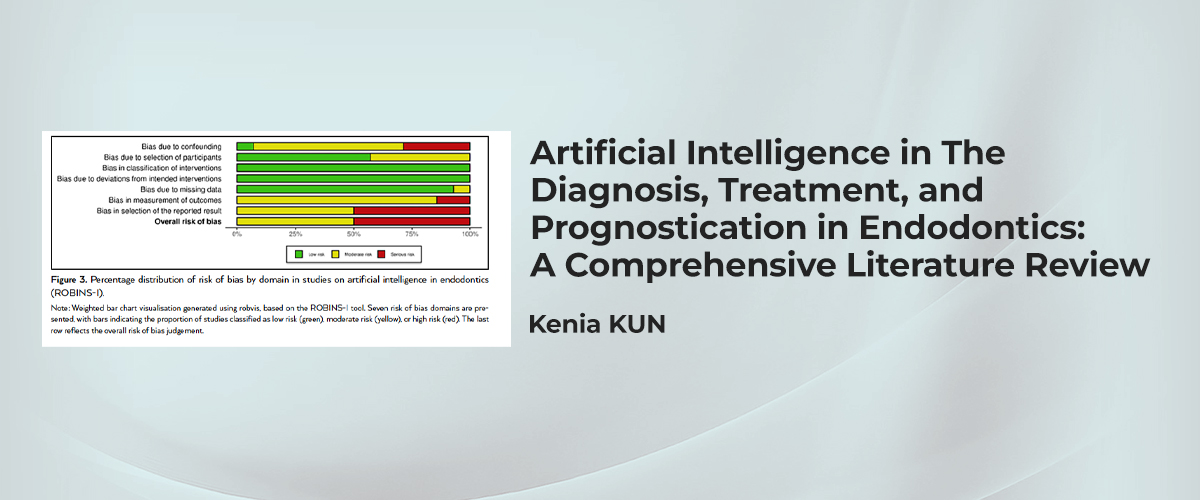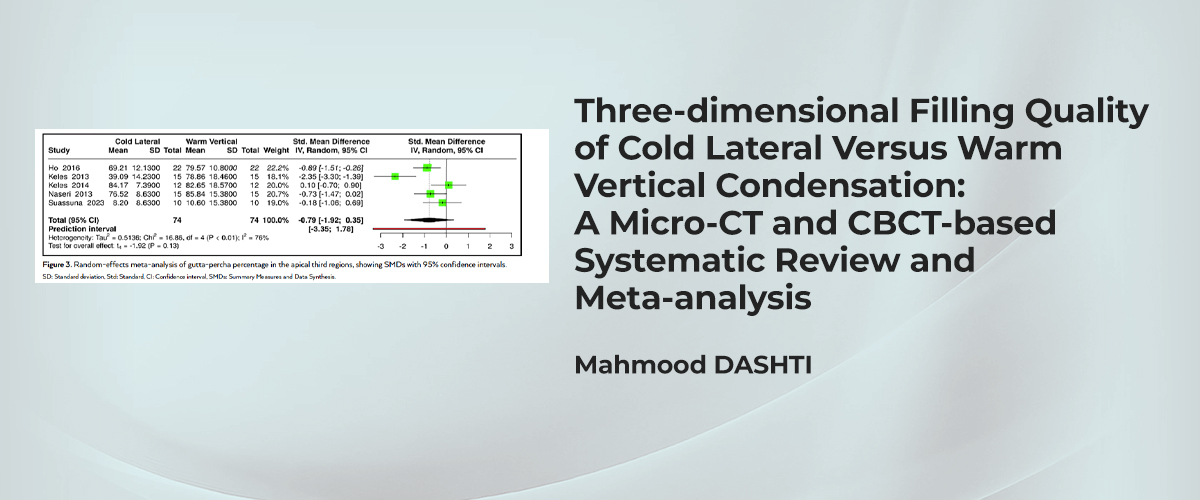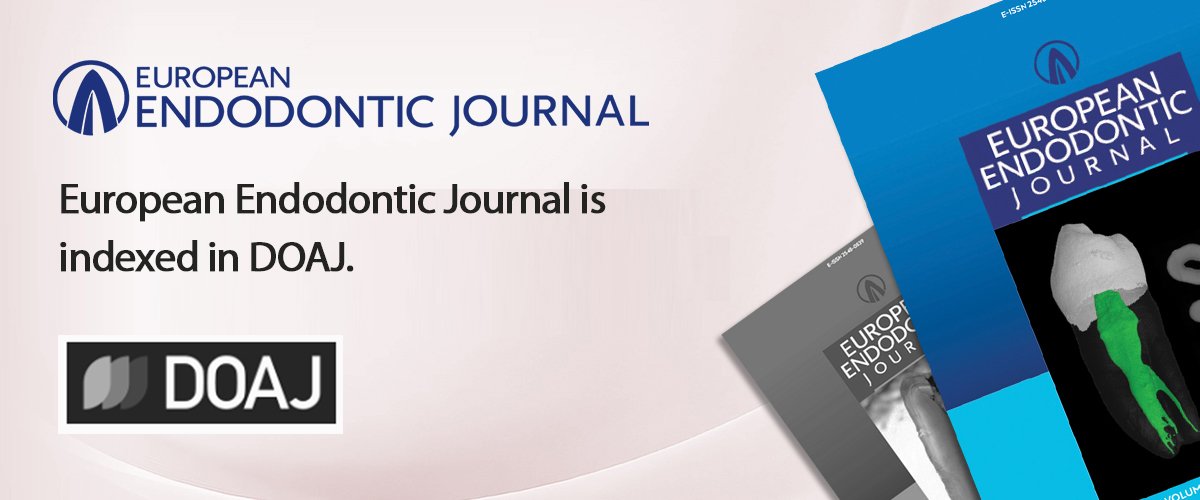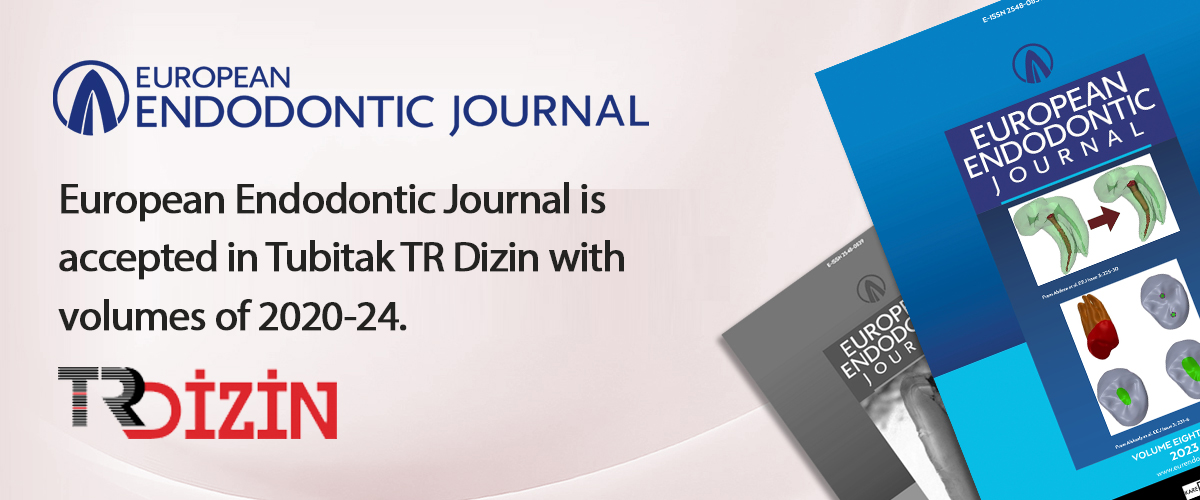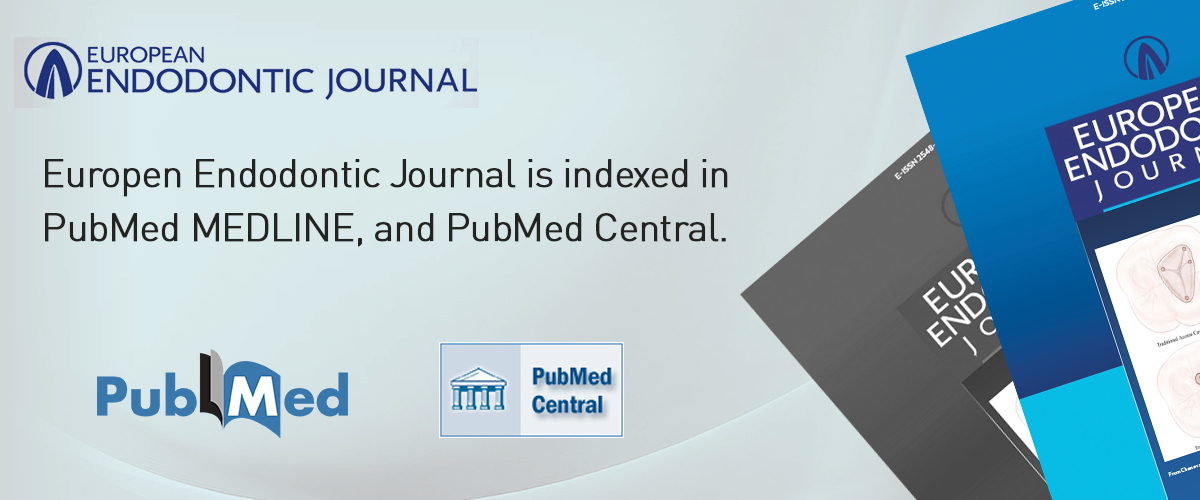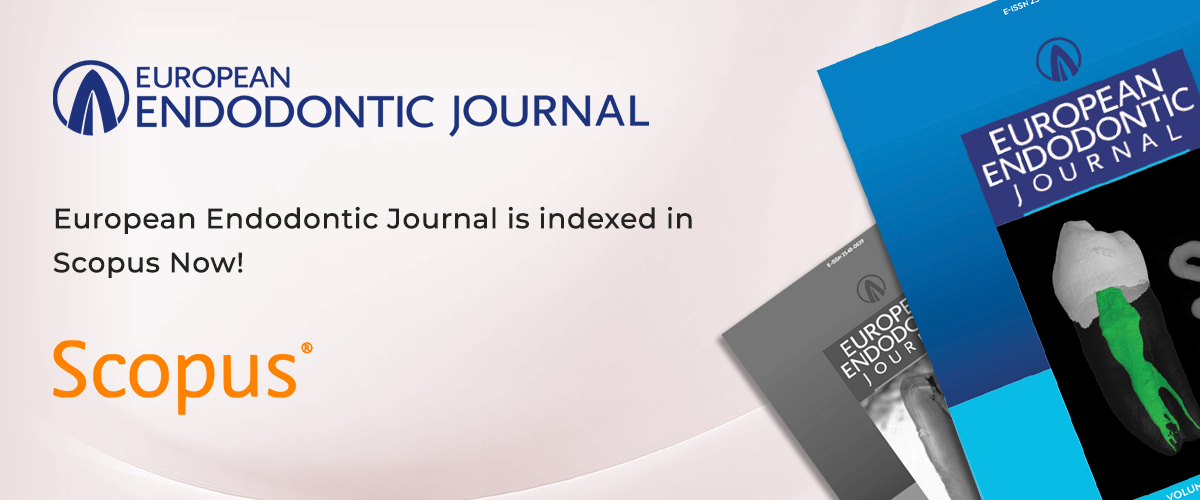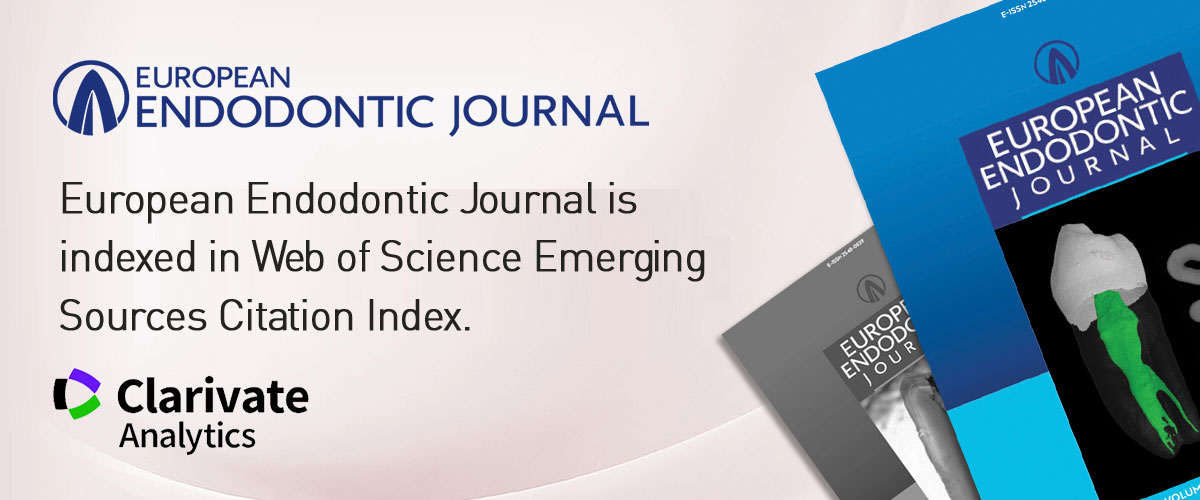Metrics
2024 IMPACT FACTOR
5 year Impact Factor
Eigenfactor Score
2024 CiteScore
Journal Citation Reports
(Clarivate 2025, JIF Rank)
Ethical Policies
Open Access Policy
European Endodontic Journal (EEJ) is an open access journal which means that all content is freely available without charge to the user or his/her institution. Users are allowed to read, download, copy, distribute, print, search, or link to the full texts of the articles, or use them for any other lawful purpose, without asking prior permission from the publisher or the author. This is in accordance with the BOAI definition of open access.
Copyright of open access article is retained by the author(s).
EEJ supports the Budapest Open Access Initiative statement of principles that promotes free access to research literature. The declaration defines open access to academic literature as free availability on the internet, permitting users to read, record, copy, print, search, or link to the full text, examine them for indexing, use them as data for software or other lawful purposes without financial, legal, or technical barriers. Information sharing represents a public good, and is essential to the advancement of science. Therefore, articles published in this journal are available for use by researchers and other readers without permission from the author or the publisher provided that the author and the original source are cited. The articles in the EEJ are accessible through search engines, websites, blogs, and other digital platforms.
Additional details on the Budapest Open Access Initiative and their guidelines are available at https://www.budapestopenaccessinitiative.org/, including a Turkish translation of the recommendations at http://www.budapestopenaccessinitiative.org/boai-10-translations/turkish-translation.
Open Access Statement
The journal is an open access journal and all content is freely available without charge to the user or his/her institution.
Except for commercial purposes, users are allowed to read, download, copy, print, search, or link to the full texts of the articles in this
journal without asking prior permission from the publisher or the author. This is in accordance with the BOAI definition of open access.
The open access articles in the journal are licensed under the terms of the Creative Commons Attribution-NonCommercial 4.0 International (CC-BY-NC 4.0) license.
Editorial Processing Charge
Submission Charges: The journal has no article submission charges.
Article Processing Charges (APCs): European Endodontic Journal levies an article-processing charge of 600 for each article accepted for publication.
The APC is payable when your manuscript is editorially accepted and before publication. The corresponding author of the manuscript is responsible for making the payment upon editorial acceptance of the manuscript. Prompt payment is recommended since we cannot publish accepted manuscripts until payment has been received.
An article-processing charge (APC) covers the range of publishing services including article production and hosting, copyediting, typesetting, publication on our website, and marketing, as well as technical development and maintenance of the publishing platform.
Authors can complete the APC process after depositing 600.- to the Euro account. The article number and corresponding author name must be written in the bank shipment description section.
For more information, please send an e-mail to Kare Publishing at [email protected].
Creative Commons License
A Creative Commons license is a public copyright license that enables the free distribution of copyrighted work. The EEJ articles are licensed under the Attribution-NonCommercial 4.0 International (CC BY-NC 4.0) version. The author grants the right to share and use original work with the condition that it be appropriately credited, it may not be used for commercial purposes, and secondary products must also be made available under the same terms of use. Specific details can be found at https://creativecommons.org/licenses/by-nc/4.0/.
The EEJ is committed to encouraging dissemination of academic work and interdisciplinary cooperation.
Ethics Policy
The observance of ethical principles throughout the research and publication process is fundamental to ensuring the integrity of the work and furthering the goal of contributing to and sharing high-quality, objective, reliable, and useful information.
The EEJ has adopted ethical principles based on the guidelines prepared by the Committee on Publication Ethics (COPE) (https://publicationethics.org/). We implement these processes to ensure appropriate support for our authors and their institutions, as well as our readers. It is crucial that all of the stakeholders in the process (authors, readers and researchers, publishers, reviewers, and editors) comply with ethical principles.
Ethical Responsibilities of the Authors
Studies submitted for publication must be original work of the author. References to other studies must be cited and/or quoted completely and accurately;
Only those who provide a substantial intellectual contribution to the content of the work may be cited as an author. Other contributors may be recognized with acknowledgements at the conclusion of the article;
All competing interests or relationships that may be perceived to constitute a conflict of interest must be declared and explained;
All studies involving human or animal subjects must comply with national and international laws and guidelines regarding privacy and ethical conduct (e.g., World Medical Association Declaration of Helsinki, US National Institutes of Health Policy on the Use of Laboratory Animals, EU Directive on the Use of Animals) and the details of approval and observance should be indicated in the Materials and Methods section of the manuscript;
Authors must be able to provide documentation showing that they have the right to use the data analyzed, all necessary permission related to the research, and appropriate consent;
Raw data and other material used in the article must be available and may be requested from the author(s) in order to verify the validity of the reporting;
In the event the author(s) notice an error at any point in the publication process or after publication, they have the obligation to inform the journal editor or publisher and cooperate in appropriate corrective action;
Authors may not submit their article for publication to more than one journal simultaneously. Each application must be initiated following the completion of any previous effort. Previously published articles, will not be accepted, including translations, without the proper acknowledgement of the original author;
Changes in authorship designation (such as adding authors, changing the printed order of the authors, removing an author) once the evaluation process has begun will not be accepted in order to protect all parties involved.
Ethical Duties and Responsibilities of the Editors
The editor is responsible for everything published in the journal. In the context of this responsibility, editors have the following duties and obligations:
Endeavor to meet the needs of readers and authors;
Maintain continuous development to improve the journal;
Consistently work to ensure quality and academic integrity. The editor is responsible for confirming that the publishing policies and standards are upheld;
Support freedom of thought;
Prevent business needs or other considerations from compromising intellectual and ethical standards, including acting in a balanced, objective, and fair manner in the course of their duties without any discrimination based on gender, religious or political beliefs, ethnic or geographical origin, sponsorship, renown, or other influence;
Apply the publicly defined publication policies created and enforced to ensure a timely and impartial evaluation process for all submissions;
Protect intellectual property and to defend the rights of the journal and author(s);
Demonstrate clarity and transparency. The editor is expected to ensure that any errors, inconsistencies, or misleading statements are corrected quickly and appropriately acknowledged;
Perform a thorough, timely, and objective investigation of any complaint or allegation of misconduct, including providing the opportunity for the author to present information refuting accusations, and to share the findings and conclusions and implement appropriate action, which may include, but is not limited to rejection of an article.
Declaration of Artificial Intelligence (AI)Assisted Technology in Scientific Writing
At submission, authors should disclose whether they used artificial intelligence (AI) assisted technologies (such as Large Language Models [LLMs], chatbots, or image creators) in the production of submitted work. Authors who use such technology should describe, in both the Title Page and the submitted work, how they used it. Authors who used AI technology to conduct the study should describe its use in the methods section in sufficient detail to enable replication to the approach, including the tool used, version, and prompts where applicable. Chatbots (such as ChatGPT) and AI assisted technologies should not be listed as an author or co-author nor cited because they cannot be responsible for the accuracy, integrity, and originality of the work, and these responsibilities are required for authorship. Therefore, humans are responsible for any submitted material that included the use of AI-assisted technologies. Authors should carefully review and edit the result because AI can generate authoritative-sounding output that can be incorrect, incomplete, or biased. Authors should be able to assert that there is no plagiarism in their paper, including in text and images produced by the AI. Humans must ensure there is appropriate attribution of all quoted material, including full citations.
Reader Relationship
The editor is to make publication decisions based on expectations of suitable and desirable material. Studies accepted for publication must be original contributions that benefit the reader, researcher, practitioner, and the literature. In addition, editors are obliged to take into account feedback from readers, researchers, and practitioners, and to provide an informative response. Readers will also be informed of any funding provided to support published research.
Author Relationship
The decision to accept an article is to be based on the importance, original value, validity, and clarity of expression of the work, and the goals and objectives of the journal;
Studies accepted for evaluation and publication will not be withdrawn unless serious problems are identified;
The editor will not disregard positive reviewer comments unless there is a serious problem with the study;
New editors will not change publishing decisions made by previous editor(s) unless there is a serious problem;
A description of the submission and evaluation process is publicly available;
Authors are provided with descriptive and informative feedback.
Reviewer Relationship
Reviewers are to be selected according to the subject of the study;
Information and guidance for the evaluation phase is provided;
Any conflicts of interest between authors and reviewers will be disclosed and managed appropriately;
Reviewer identity is to be kept confidential to preserve a blind review process;
Reviewers are to evaluate the study using unbiased, scientific, and constructive comments. Unkind or unscientific commentary will not be permitted;
Reviewers will be evaluated using criteria such as timely response and quality of observations;
The pool of reviewers is to be assessed and supplemented regularly to ensure a broad scope of expertise.
Editorial Board Relationship
The editor works with the members of the editorial board to ensure that they are familiar with journal policies and developments in regular meetings and announcements, and will provide training for new members and assistance to board members during their tenure in their role as a supporter of the journal.
Editorial board members must be qualified and able to contribute to the journal;
Members of the editorial board must evaluate studies impartially and independently;
Editorial board members with the appropriate expertise will be given the opportunity to evaluate suitable articles;
The editor will maintain regular contact with the editorial board and hold regular meetings regarding the development of editorial policies and other aspects of journal management.
Creativity and Openness
Constructive criticism is to be encouraged;
Authors will be given the opportunity to reply to criticism or lodge complaints;
Negative results will not be a reason for submission denial.
Peer-Review Policy
Only those manuscripts approved by its every individual author and that were not published before in or sent to another journal, are accepted for evaluation.
Submitted manuscripts that pass preliminary control are scanned for plagiarism using iThenticate software.
After plagiarism check, the eligible ones are evaluated by Editor-in-Chief for their originality, methodology, the importance of the subject covered and compliance with the journal scope.
Editor-in-Chief evaluates manuscripts for their scientific content without regard to ethnic origin, gender, sexual orientation, citizenship, religious belief or political philosophy
of the authors and ensures a fair double-blind peer review of the selected manuscripts.
The selected manuscripts are sent to at least two national/international referees for evaluation and publication decision is given by Editor-in-Chief upon modification by the
authors in accordance with the referees' claims.
Editor-in-Chief does not allow any conflicts of interest between the authors, editors and reviewers and is
responsible for final decision for publication of the manuscripts in the Journal.
Reviewers' judgments must be objective. Reviewers' comments on the following aspects are expected while conducting the review.
Does the manuscript contain new and significant information?
Does the abstract clearly and accurately describe the content of the manuscript?
Is the problem significant and concisely stated?
Are the methods described comprehensively?
Are the interpretations and consclusions justified by the results?
Are adequate references made to other Works in the field?
Is the language acceptable?
Reviewers must ensure that all the information related to submitted manuscripts is kept as confidential and must report to the editor
if they are aware of copyright infringement and plagiarism on the authors side.
A reviewer who feels unqualified to review the topic of a manuscript or knows that its prompt review will be
impossible should notify the editor and excuse himself from the review process.
The editor informs the reviewers that the manuscripts are confidential information and that this is a privileged interaction.
The reviewers and editorial board cannot discuss the manuscripts with other persons. The anonymity of the referees is important.
Ethical Responsibilities of the Reviewers
Peer review of research embodies the scientific method, subjecting the work to the exacting scrutiny of knowledgeable colleagues. The rigor of the review process directly affects the quality of the literature; it provides confidence in an objective and independent evaluation of the published work. The EEJ uses a double-blind review process. All comments and the evaluation are transmitted through the journal management system. Reviewers should:
Only agree to evaluate studies related to their specialty;
Return reviews promptly and within the designated timeframe;
Evaluate with impartiality. Nationality, gender, religious beliefs, political beliefs, commercial concerns, or other considerations must not influence the evaluation;
Refuse to review any work with a potential conflict of interest and inform the journal editor;
Maintain confidentiality of all information. Destroy manuscripts and related material following the review. Only the final published version may be used for any purpose;
Report any suspicion of misconduct to the editor;
Use thoughtful and constructive language intended to improve the quality of the article. Hostile or derogatory comments are not acceptable.
Communications between Editors and peer reviewers contain confidential information that should not be shared with third parties. Reviewers who seek assistance from a trainee or colleague in the performance of a review should acknowledge these individuals' contributions in the written comments submitted to the editor. Reviewers must maintain the confidentiality of the manuscript, which may prohibit the uploading of the manuscript to software or other AI technologies where confidentiality cannot be assured. Reviewers must request permission from the journal prior to using AI technology to facilitate their review.
Ethical Responsibilities of the Publisher
The role of the publisher includes stewardship of the scholarly record. As such, the publisher should:
Abide by ethical principles related to research integrity; the process of application, review, and selection; and publication;
Collaborate with the editor and the editorial board to maintain and develop the journal in a relationship that recognizes editorial independence and is defined by written agreement;
Publish content in a timely manner, including corrections, clarifications, and retractions;
Preserve published work.
The publication processes of the journal are conducted in accordance with the guidelines of International Committee of Medical Journal Editors (ICMJE), the World Association of Medical Editors (WAME), the Council of Science Editors (CSE), the Committee of Publication Ethics (COPE), the European Association of Science Editors (EASE) and National Information Standards Organization (NISO).
Examples of some activities considered to be contrary to scientific research and publication ethics:
Plagiarism: The representation of the ideas, methods, data, or other work of another, in whole or in part, as ones own. The original source must be appropriately acknowledged. Authors are encouraged to offer unique work that does not rely on substantial use of other sources, regardless of citation.
Fraud: The use of fabricated or falsified data or other deceptive misrepresentation of fact.
Distortion: Manipulation of the research records, data, images, or results, or presenting unused devices or materials as if they were used in the research, particularly in the interests of study sponsors.
Republication: Duplicate submissions presented as unique publications.
Slicing: The use of a portion of data or findings derived from a single research idea in multiple smaller units as separate publications.
Inaccurate authorship: The inclusion of individuals as named authors who were not active contributors, the failure to include contributors, or the inappropriate ranking of authors.
Lack of acknowledgement of individuals, institutions, or organizations that provided financial or other substantial support to the work.
Use of a thesis or unpublished study without the permission of the owner.
Failure to comply with ethical rules for human and animal research, including respect for patient rights and animal welfare, or obtaining the required approval.
The misuse of resources, facilities, or devices provided for scientific research.
The use of false or misleading statements.
On rare occasions it may be necessary for a journal to impose sanctions on researchers who have engaged in questionable research practices or publishing ethics malpractice: for example, a ban against publishing any further articles in the journal when doing so puts the journals reputation demonstrably at risk, or not permitting a researcher to serve as a reviewer or editor. Bans of this nature may be implemented for a period of time and revoked or extended if necessary, upon review at the conclusion of the allotted time period. Sanctions may be appealed by writing to the journal editor.
Plagiarism Policy
Plagiarism is the theft of anothers work and a violation of ethics, regardless of whether it is intentional or not. It is unacceptable conduct to submit or publish manuscripts using other sources without appropriately citing the reference. It is the policy of the EEJ, to use plagiarism detection software for all submissions and to perform an editorial review when necessary. The editor or the editorial board may request revision or reject a manuscript that does not meet publication standards, including plagiarism, citation or other manipulation, or any fraudulent misrepresentation.
Copyright Transfer
Articles published in EUROPEAN ENDODONTIC JOURNAL have the international license of (CC-BY-NC) "Creative Commons Attribution-NonCommercial 4.0".
Accordingly, the authors who publish their articles in the journal are deemed to have accepted the following conditions:
- The author(s) retain the copyright of the article and give the journal the first publication right. The article is licensed under the Creative Commons Attribution license, which allows it to be shared by others, provided that the author(s) are specified and published first in this journal.
- The author(s) can make a separate agreement for the distribution of the published version in the journal of the article (such as sending to an institutional database or publication in a book) without giving full authorization.
- The author(s) can share the published version of the article on the corporate database or on their own websites. This can lead to efficient exchanges, earlier dissemination of the article and more citations. The final form of the manuscript has been seen and approved by all authors.
Conflict of Interest
The editor is required to ensure that any conflicts of interest between authors, reviewers, or other parties are disclosed and managed appropriately to provide an independent and impartial process. Any potential perception of a financial or personal interest that may affect decision-making creates a conflict of interest. The presence of a conflict of interest is independent of the occurrence of inappropriateness. The reliability of the scientific process and published articles is directly related to the objective consideration of conflicts of interest during the planning, implementation, writing, evaluation, editing, and publication of scientific studies.
Financial relationships are the most easily identified conflicts of interest, and if undisclosed, they undermine the credibility of the journal, the authors, and the science. However, conflicts can also occur through individual relationships, academic competition, intellectual approach, and more. Authors should refrain as much as possible from any relationship that could restrict their ability to objectively access data or analyze, interpret, prepare, and publish their article. Authors must disclose any relationships related to study submissions.
Editors and peer reviewers should also be aware of potential conflicts of interest and refrain from engaging in any activity that could be questionable and report associations that could be perceived as presenting a conflict.
The publication team works diligently to ensure that the evaluation process is conducted in an impartial manner in order to protect the interests of all parties. The conflict of interest form and more detailed information are available at: http://www.icmje.org/disclosure-of-interest/
Archiving Policy
The content published by EEJ is electronically preserved by using Internet and PubMed Central Archives.
1- https://eurendodj.com/jvi.aspx?pdir=eurendodj&plng=eng&list=pub
2- https://www.ncbi.nlm.nih.gov/pmc/journals/3757/


